Cost-Benefit Analysis Course
Cost-Benefit Analysis Course in Singapore
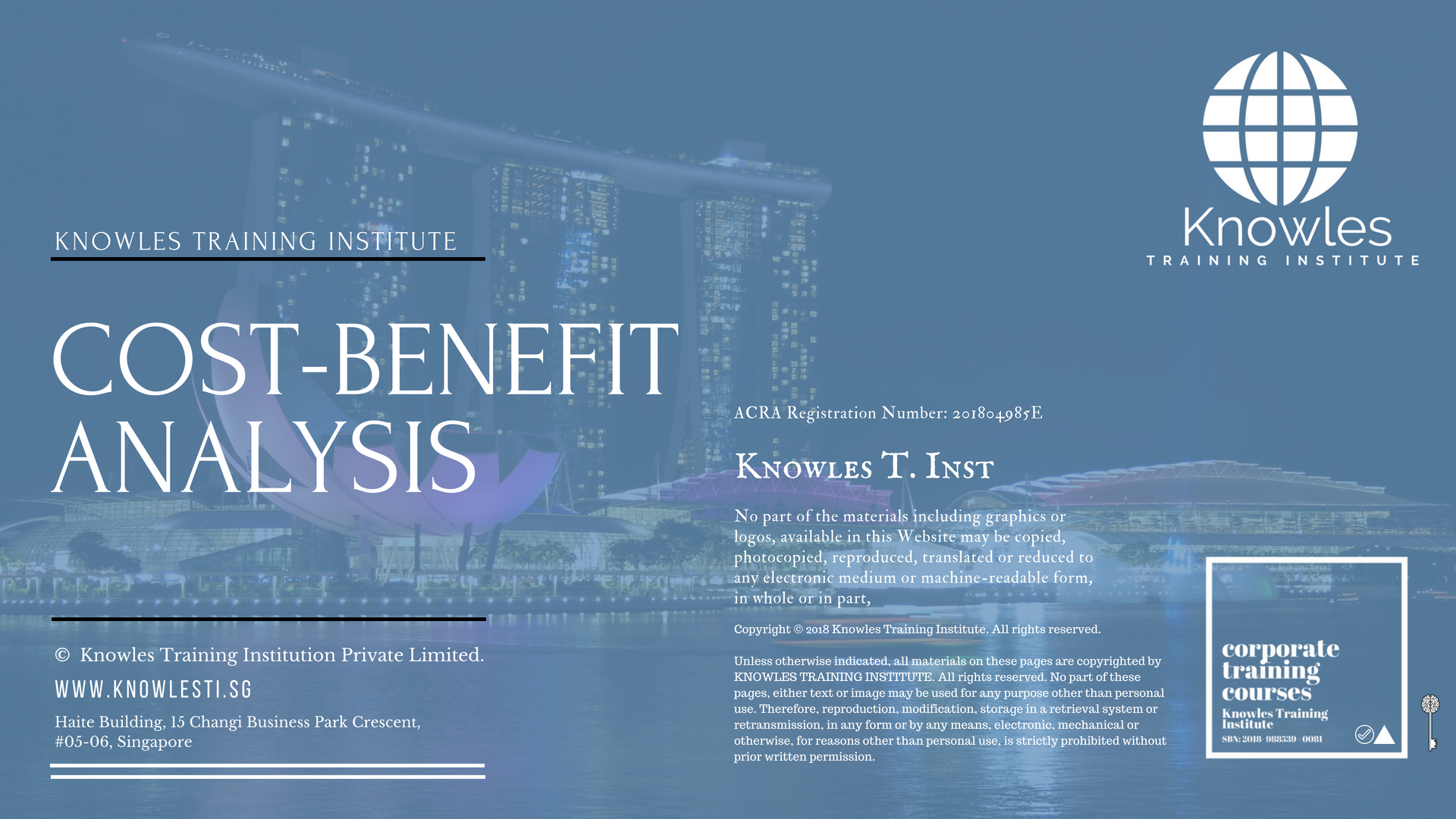
About This Cost-Benefit Analysis Training Course
Cost-Benefit Analysis Course in Singapore
Cost-benefit analysis or CBA is a systematic approach to evaluating the strengths and weaknesses of choices used to discover which options provide the most significant method for obtaining benefits while conserving savings. Examples include transactions, various business activities, as well as functional business requirements.
Course Schedule
| COURSES | DATES | TIME | VENUE | COUNTRY | REGISTRATION |
|---|---|---|---|---|---|
| Cost Based Analysis Course | 4 May, 2024 - 5 May, 2024 | 9 am to 5 pm | Online / Face to Face | Singapore | |
| Cost Based Analysis Course | 4 June, 2024 - 5 June, 2024 | 9 am to 5 pm | Online / Face to Face | Singapore | |
| Cost Based Analysis Course | 5 July, 2024 - 6 July, 2024 | 9 am to 5 pm | Online / Face to Face | Singapore | |
| Cost Based Analysis Course | 4 August, 2024 - 5 August, 2024 | 9 am to 5 pm | Online / Face to Face | Singapore | |
| Cost Based Analysis Course | 4 September, 2024 - 5 September, 2024 | 9 am to 5 pm | Online / Face to Face | Singapore | |
| Cost Based Analysis Course | 3 October, 2024 - 4 October, 2024 | 9 am to 5 pm | Online / Face to Face | Singapore | |
| Cost Based Analysis Course | 3 November, 2024 - 4 November, 2024 | 9 am to 5 pm | Online / Face to Face | Singapore | |
| Cost Based Analysis Course | 3 December, 2024 - 4 December, 2024 | 9 am to 5 pm | Online / Face to Face | Singapore |
Who Should Attend This Cost-Benefit Analysis Workshop
This Cost-Benefit Analysis workshop is ideal for anyone who would like to gain a strong grasp and improve their Cost-Benefit Analysis.
All Staff Within An Organisation
Managers
Team Leaders
Executives
Assistants
Officers
Secretaries
Group Size For This Cost-Benefit Analysis Training Program
The ideal group size for this Cost-Benefit Analysis course is:
Minimum: 5 Participants
Maximum: 15 Participants
Course Duration
The duration of this Cost-Benefit Analysis workshop is 2 full days. Knowles Training Institute will also be able to contextualised this workshop according to different durations; 3 full days, 1 day, half day, 90 minutes and 60 minutes.
2 Full Days
9 a.m to 5 p.m
Course Benefits
Below is the list of course benefits of our Cost-Benefit Analysis course
- Have a better understanding of cost-benefit analysis
- Appreciate importance of cost-benefit analysis
- Maximize the accuracy of a cost-benefit analysis
- Be equipped of the basic knowledge in comparing costs and benefits in a company
- Learn a systematic process to achieve benefits while preserving savings
- Be able to use systematic approach to estimate the strengths and weaknesses
- Comprehend key elements to identify present and future costs and benefits
- Identify limitations and learn to handle them effectively
- Be equipped how to maximize cost-benefit analysis in corporate situations
- Achieve accuracy in cost-benefit analysis
- Comprehend economic efficiency cost and benefits
- Gain skills on how to effectively communicate cost-benefit analysis outcome
Course Objectives
Below is the list of course objectives of our Cost-Benefit Analysis course
- Define cost-benefit analysis
- Understand the importance of cost-benefit analysis in an organization
- List the benefits of cost-benefit analysis
- Learn the basic knowledge of cost-benefit analysis
- Illustrate the cost-benefit analysis process
- Understand how important assumption models and good approximations
- Describe each components of a cost-benefit analysis
- Discuss the limitations involved in a cost-benefit analysis
- Discuss advantages of cost-benefit analysis in corporate situations
- Identify an accurate benefit analysis
- Determine if an investment is feasible
- Present an effective cost-benefit analysis outcome
Course Content
Below is the list of course content of our Cost-Benefit Analysis training course
- What is a cost-benefit analysis
- Why is cost-benefit analysis important
- What are the advantages of a cost-benefit analysis in a company
- Discussion of cost-benefit analysis basics
- Understanding the comprehensive cost-benefit analysis process
- Relevant modelling assumptions or approximations used in cost-benefit analysis
- What are the components of a cost-benefit analysis
- What are the limitations of a cost-benefit analysis
- How to leverage cost-benefit analysis in given situations
- How to ensure accuracy in a cost-benefit analysis
- How to measure benefits and costs
- How to effectively communicate the results of the cost-benefit analysis
Cost-Benefit Analysis Value Added Materials
Each participant will receive the following materials for the Cost-Benefit Analysis course
Cost-Benefit Analysis Learner’s Guide
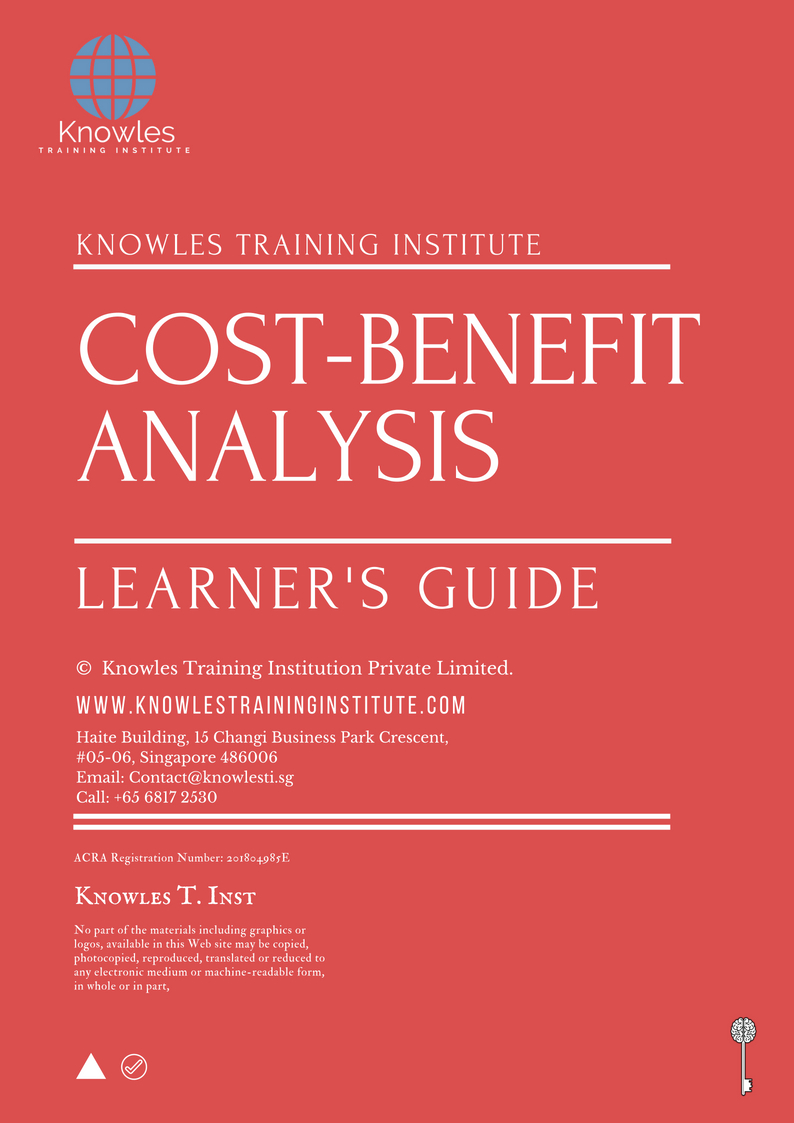
Cost-Benefit Analysis Key Takeaways Notes
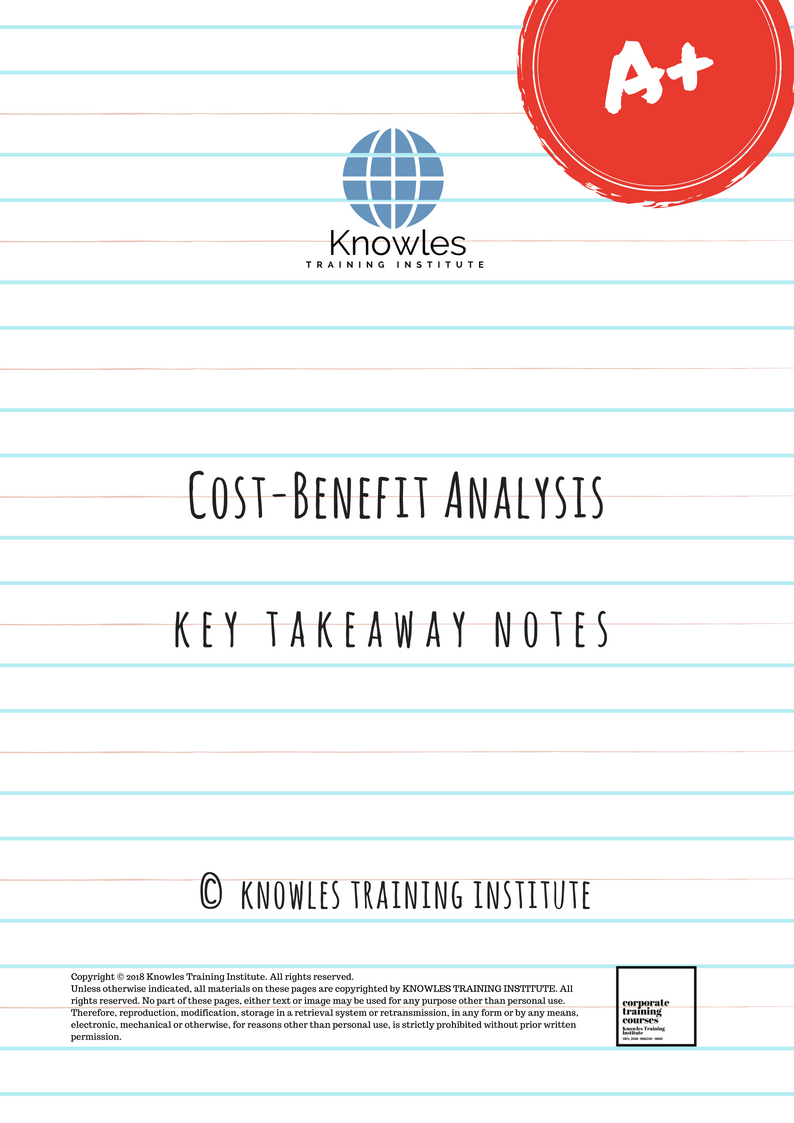
Cost-Benefit Analysis Essentials Ebook
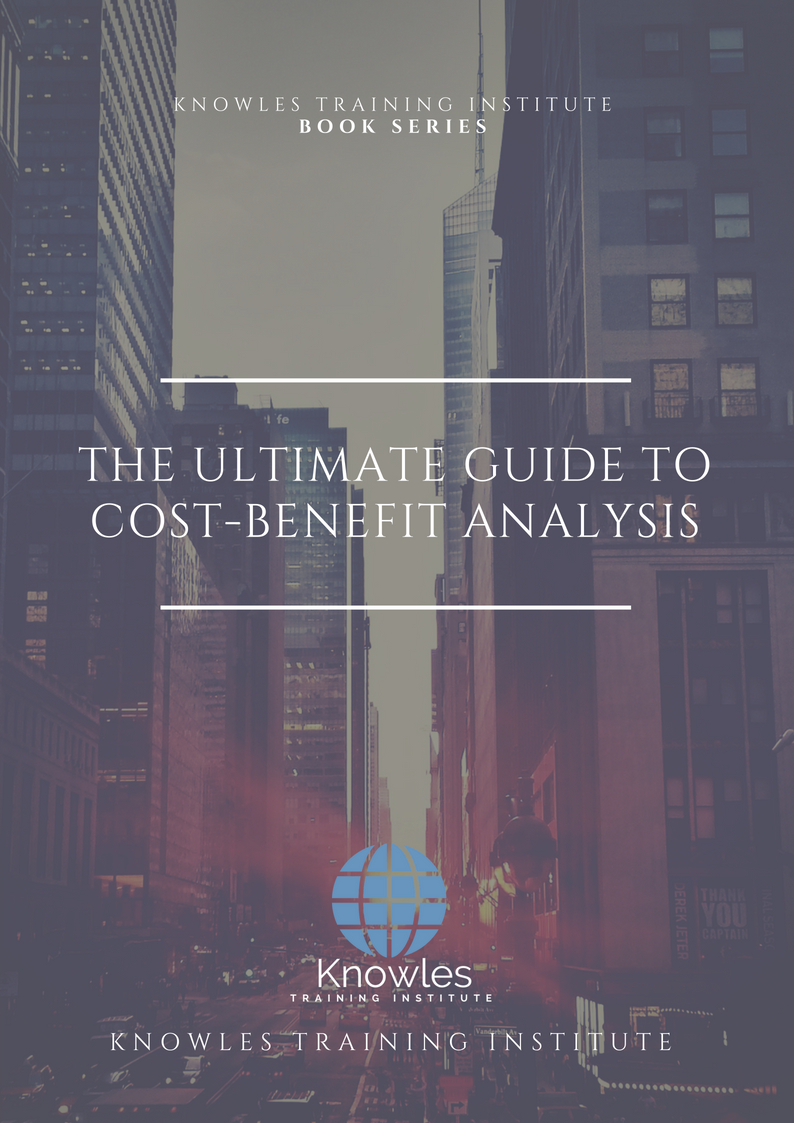
Cost-Benefit Analysis Course Handouts
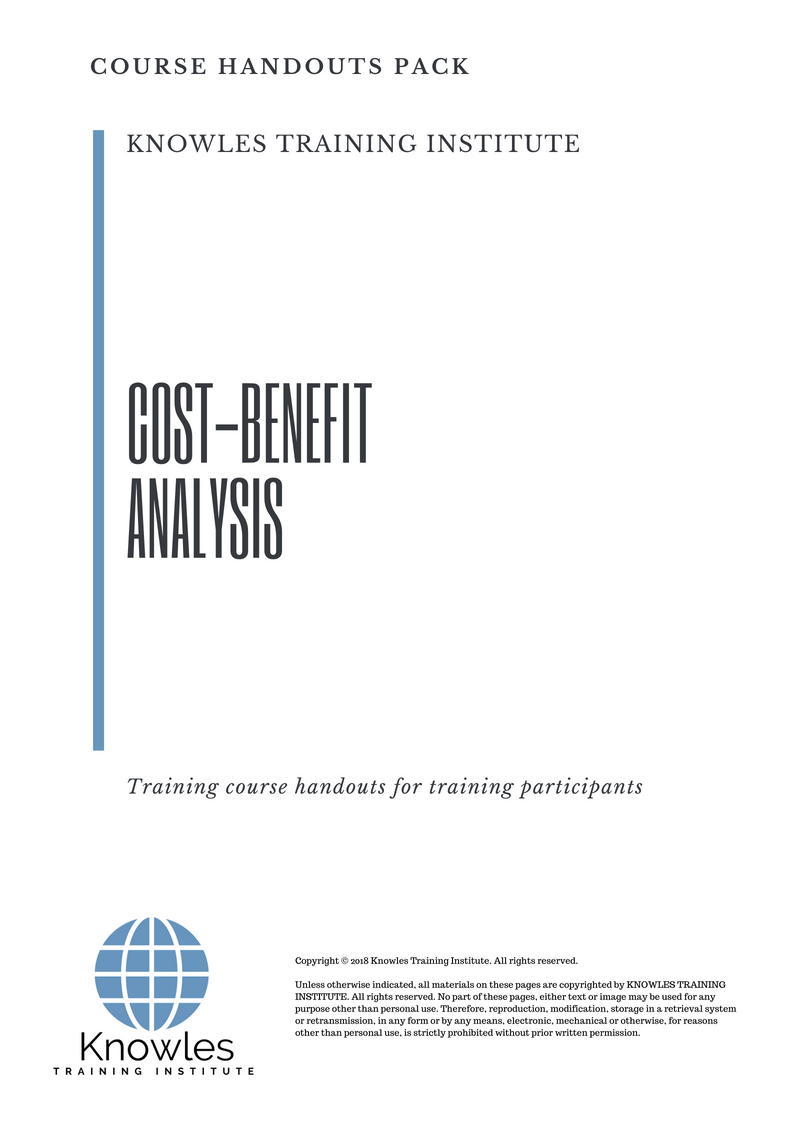
Cost-Benefit Analysis 30-Day Action Plan
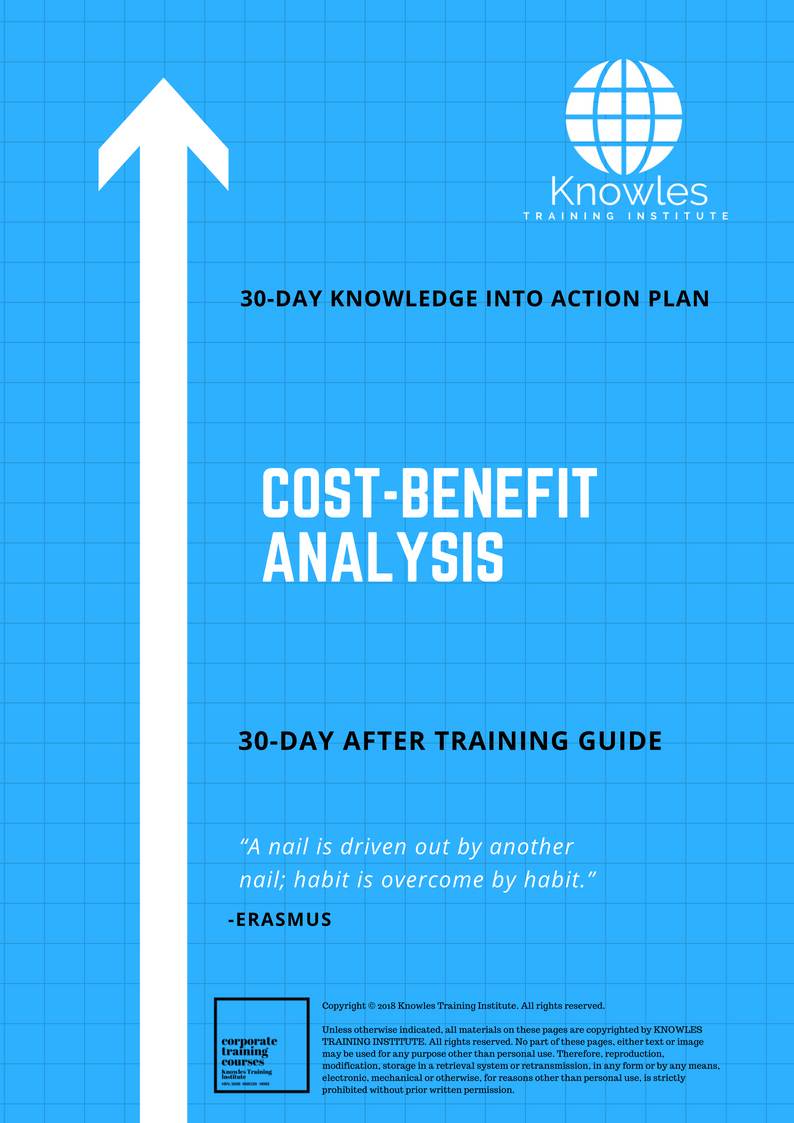
Cost-Benefit Analysis MindMaps Pack
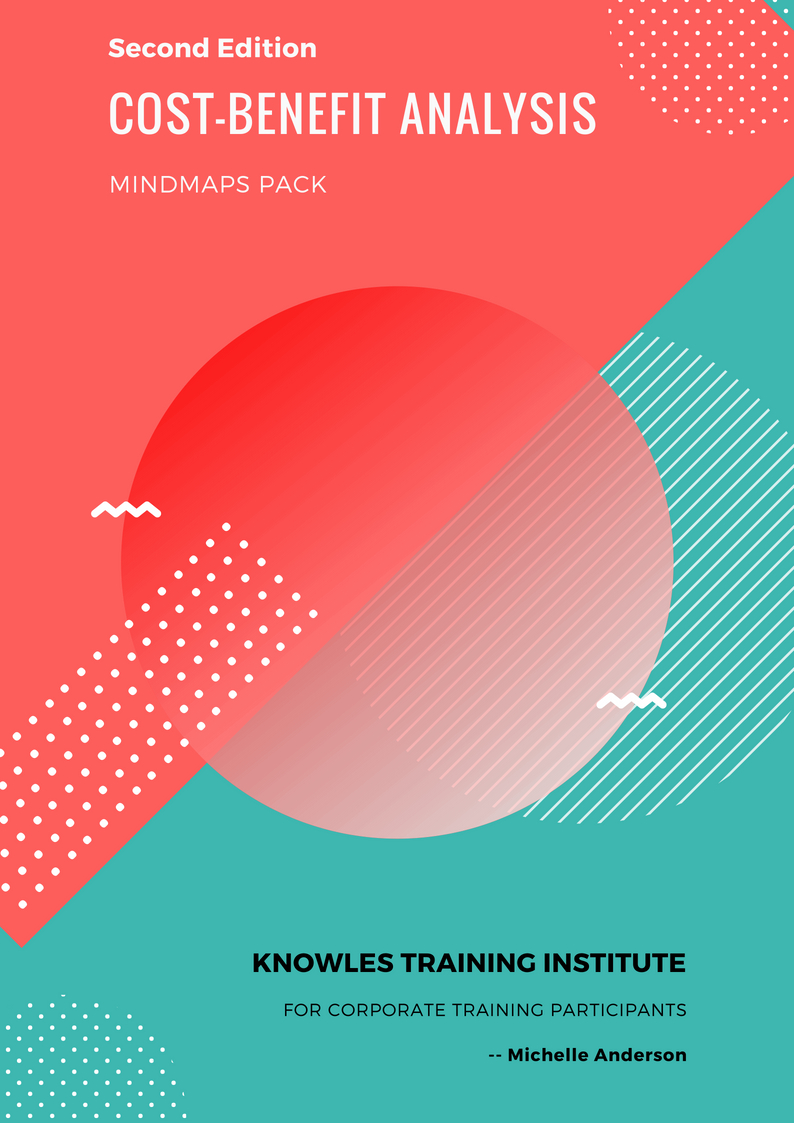
Cost-Benefit Analysis PPT Slides Used During Course
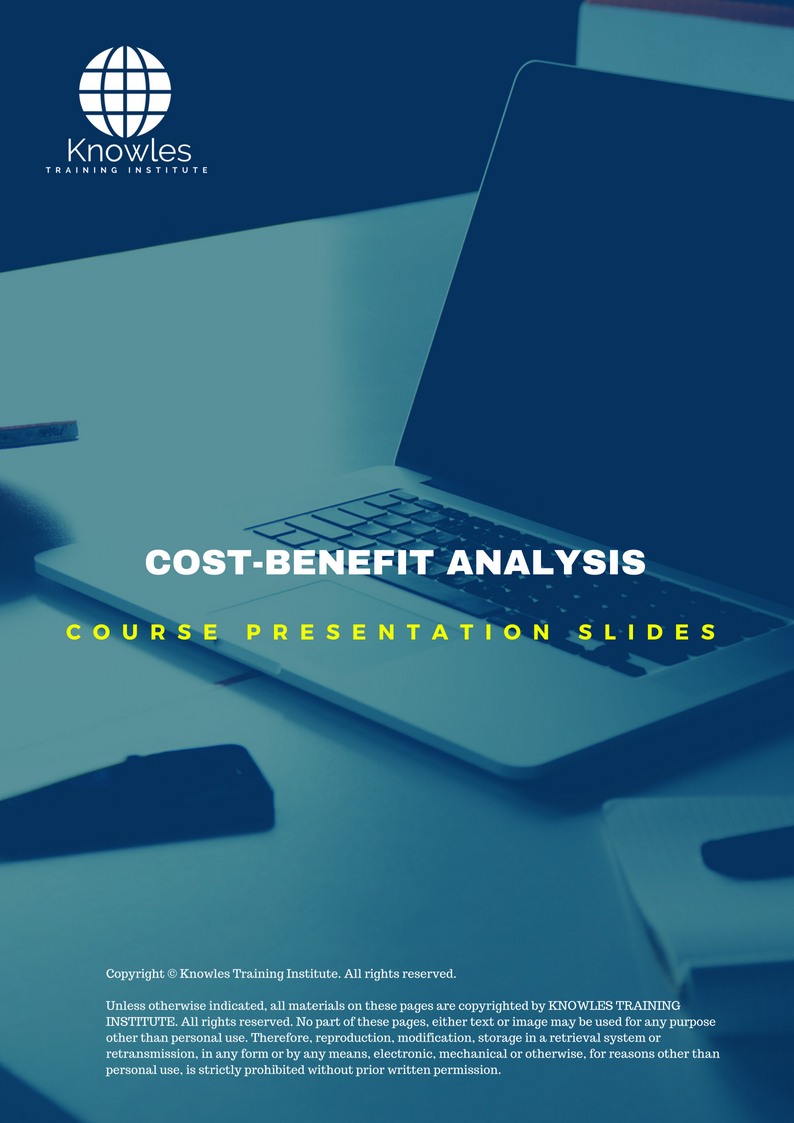
Cost-Benefit Analysis Long-Term Memory Flashcards Pack
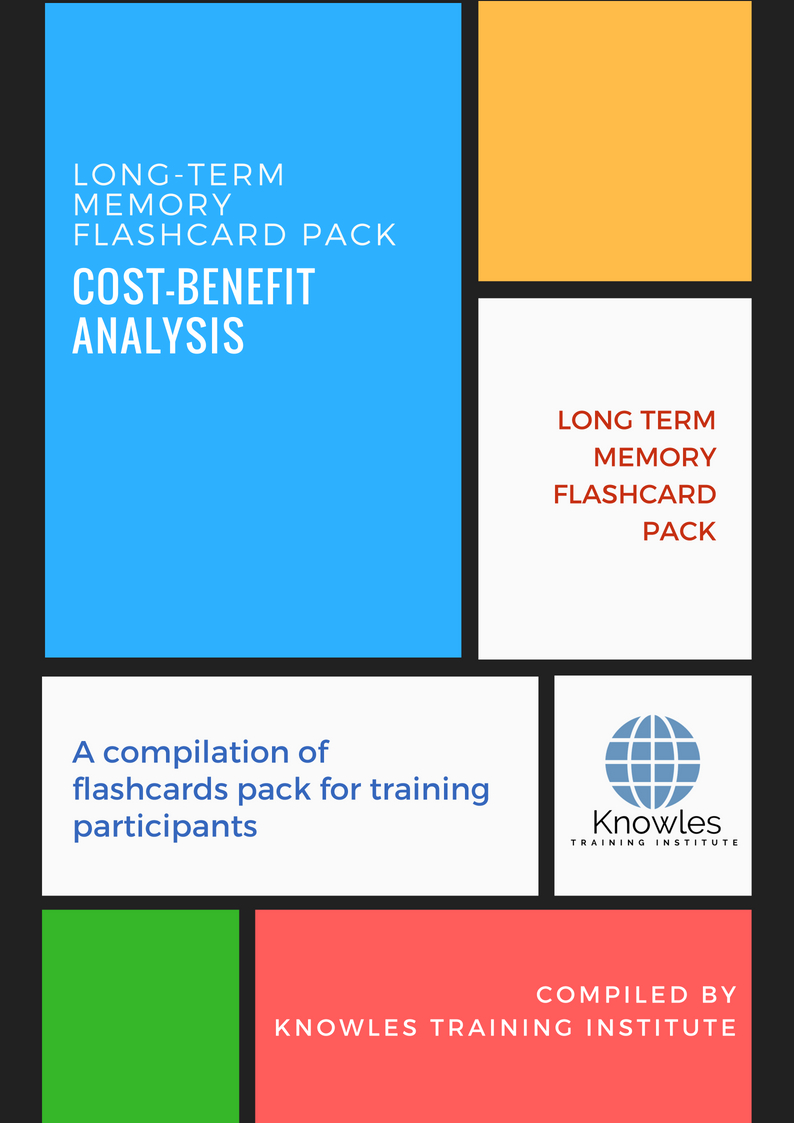
Cost-Benefit Analysis E-Learning Course
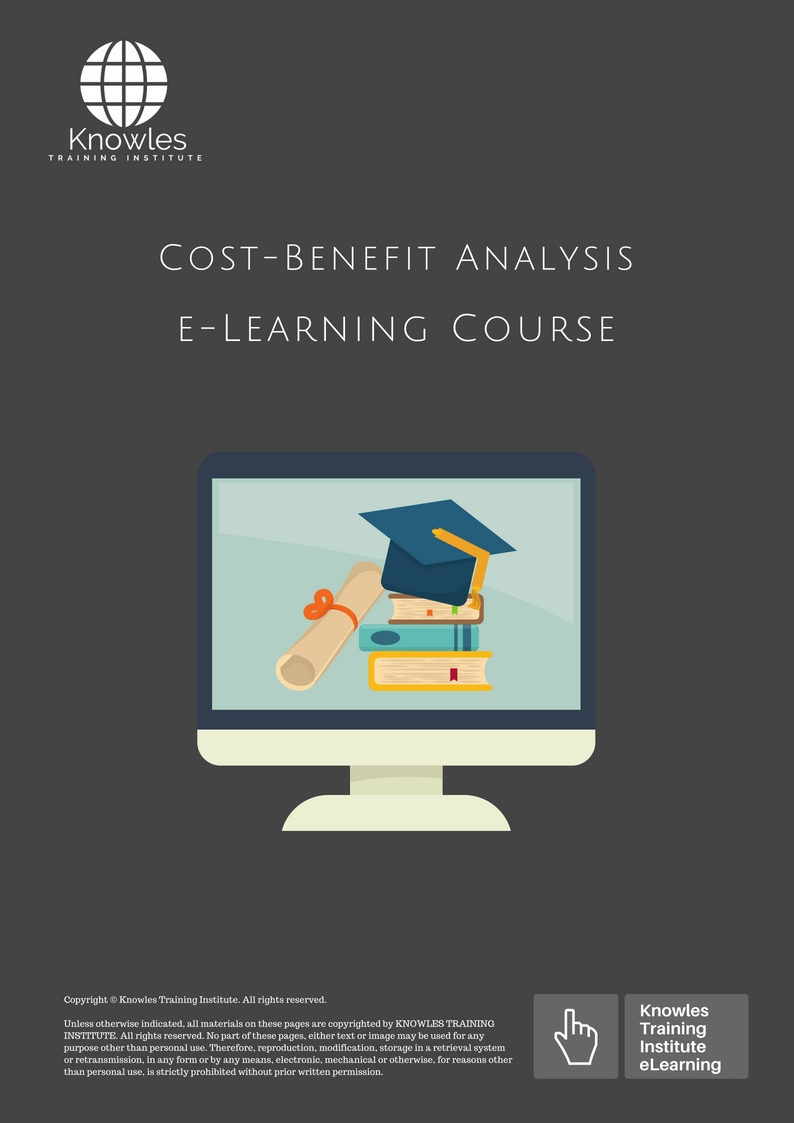
Cost-Benefit Analysis Online Video Course

Cost-Benefit Analysis Essentials Audiobook
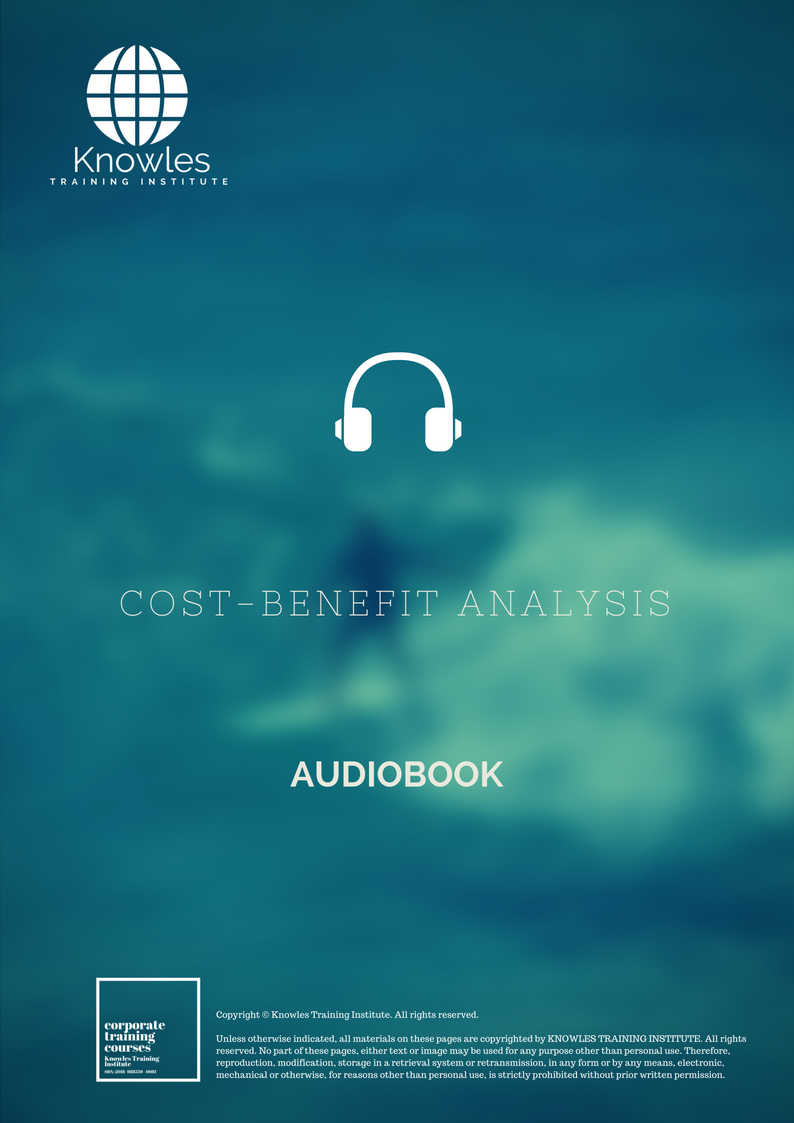
Cost-Benefit Analysis Infographics Pack
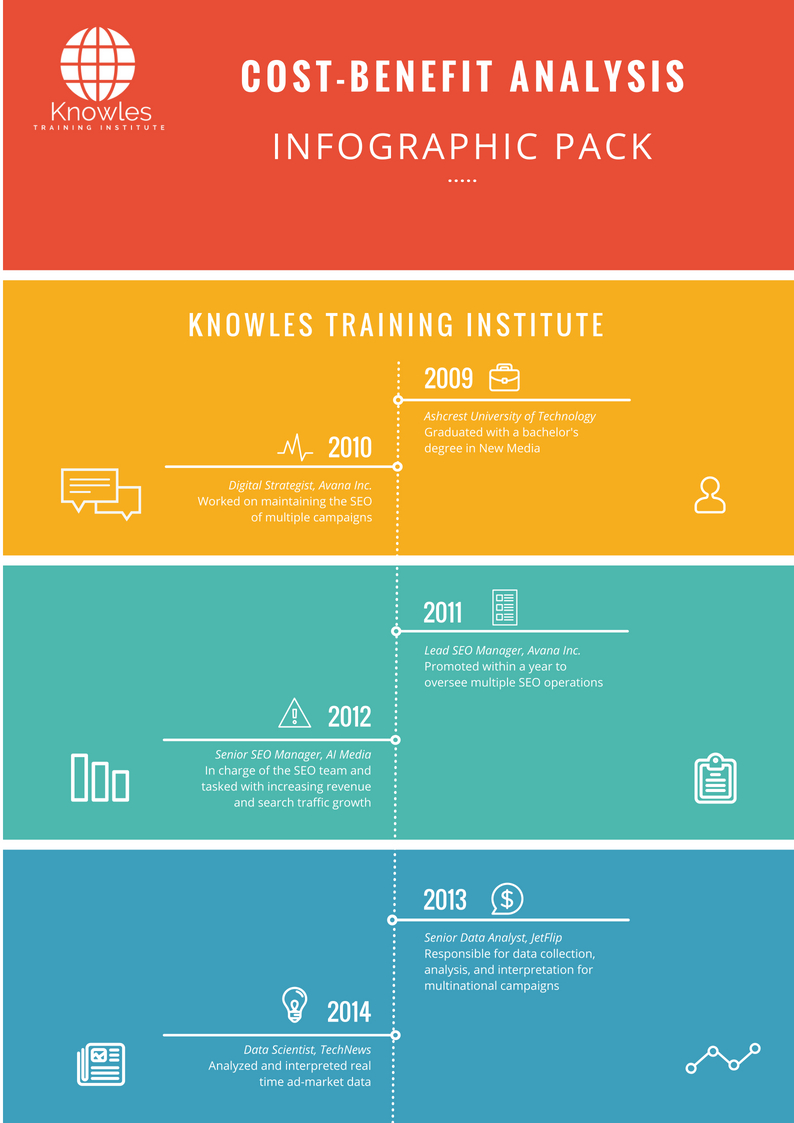
Cost-Benefit Analysis Certification
Each course participant will receive a certification of training completion

Course Fees
There are 4 pricing options available for this Cost-Benefit Analysis training course. Course participants not in Singapore may choose to sign up for our online Cost-Benefit Analysis training course.
SGD 1,334.96 For a 60-minute Lunch Talk Per Session.
- SGD 584.96 For a Half Day Course Per Participant.
- SGD 884.96 For a 1 Day Course Per Participant.
- SGD 1,184.96 For a 2 Day Course Per Participant.
Discounts available for more than 2 participants.
Upcoming Course Schedule
Contact us for the latest Cost-Benefit Analysis course schedules:
Phone: +65 6714 6663
Email: contact@knowlesti.com
Message:
Download Course Brochure
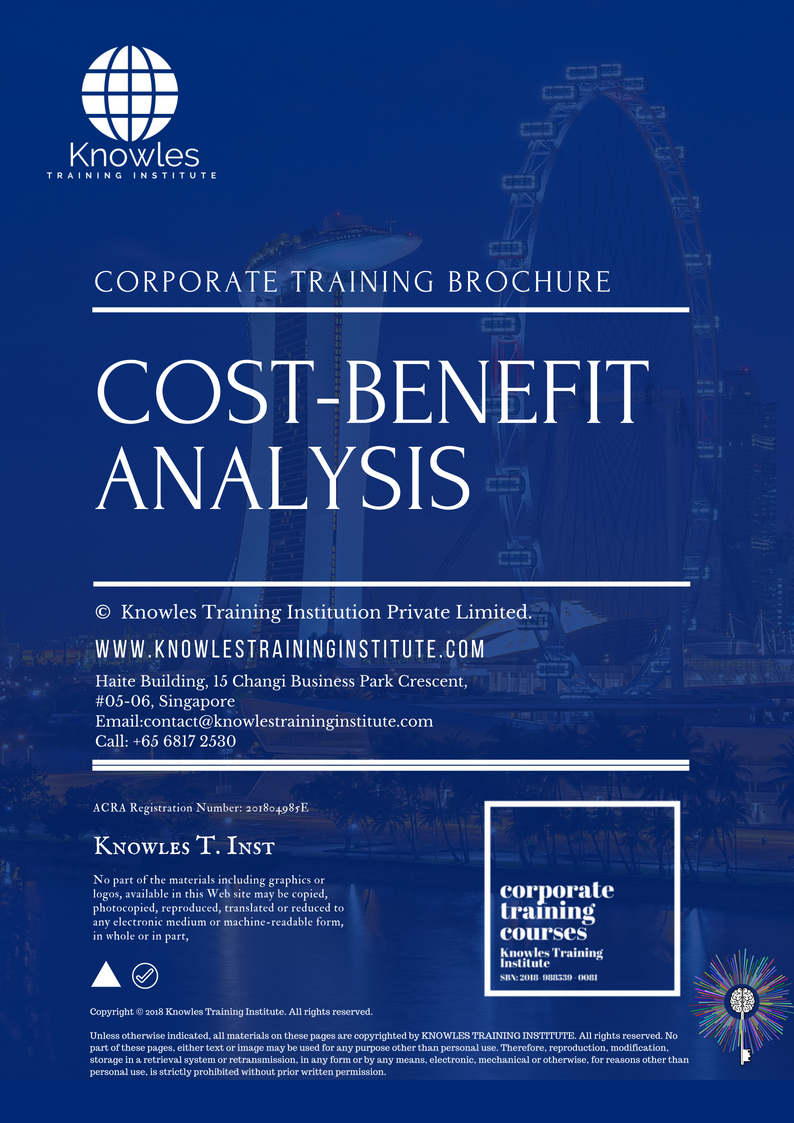
Request for this Cost-Benefit Analysis course brochure. Fill up the short information below and we will send it to you right away!
Post-Training Support: A vast majority of training does not have any effect beyond 120 days. But to work, training has to have a strong pre- and post-training component. Post-training reinforcement consequently helps individuals to recall the understanding and ask questions.
Blended Learning: Learning does not occur in the classroom. Virtually everybody prefers distinct ways of learning. Successful learning should have a multi-channel, multi-modal strategy.
We Understand The Industry: Similarly, we’ve got a profound comprehension of the business, business design, challenges, strategy and the that our participants are in and have designed the courseware to cater to their professional needs.
Course Content: Knowles Training Institute’s material is relevant, of high quality and provide specific learning outputs. As a result, Participants will leave the training course feeling as they have gained a strong understanding and will also be in a position to execute what they have learned sensibly.
Course Development — The workshop modules follow a systematic and logical arrangement. Therefore, this structure helps to ensure that the course material allows the facilitators to deliver the course in a logical arrangement. Consider the subjects as building bricks into learning, our facilitators slowly build towards a comprehensive picture of this entire topic.


Course Enquiries

Fill up the form and we will get back to you in less than 1 working day.
Alternatively, give us a call to have one of our training consultants contact you. Our corporate training courses can be contextualized to meet your organization’s training needs. Leverage on our large pool of professional trainers and consultants for your organization’s training needs.
Office Address: 60 Paya Lebar Rd, #07-54 Paya Lebar Square, Singapore 409051
Office Phone: +65 6714 6663
Email: contact@knowlesti.sg
We Guarantee 100% Privacy. We Respect Your Privacy. Your Information Will Never Be Shared.


